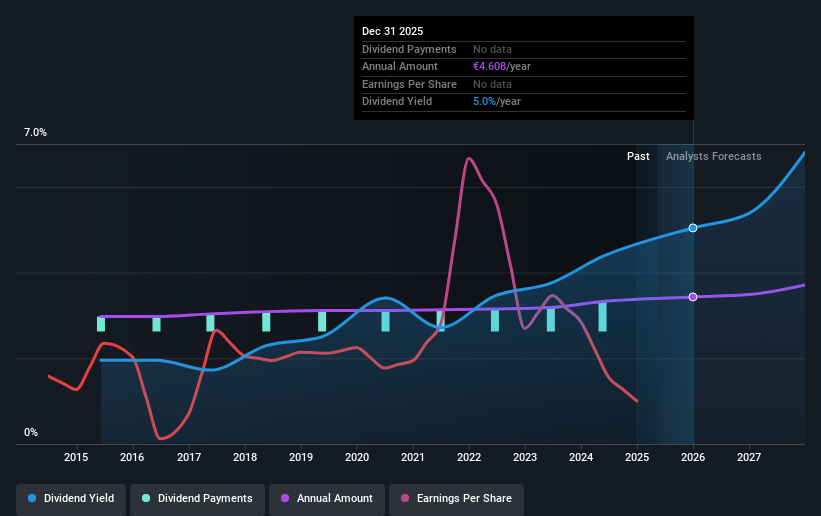- France
- /
- Diversified Financial
- /
- ENXTPA:MF
We Wouldn't Be Too Quick To Buy Wendel (EPA:MF) Before It Goes Ex-Dividend
Some investors rely on dividends for growing their wealth, and if you're one of those dividend sleuths, you might be intrigued to know that Wendel (EPA:MF) is about to go ex-dividend in just 3 days. The ex-dividend date is usually set to be two business days before the record date, which is the cut-off date on which you must be present on the company's books as a shareholder in order to receive the dividend. The ex-dividend date is an important date to be aware of as any purchase of the stock made on or after this date might mean a late settlement that doesn't show on the record date. This means that investors who purchase Wendel's shares on or after the 21st of May will not receive the dividend, which will be paid on the 23rd of May.
The company's next dividend payment will be €4.70 per share, and in the last 12 months, the company paid a total of €4.70 per share. Based on the last year's worth of payments, Wendel has a trailing yield of 5.1% on the current stock price of €91.40. Dividends are a major contributor to investment returns for long term holders, but only if the dividend continues to be paid. So we need to investigate whether Wendel can afford its dividend, and if the dividend could grow.
Dividends are typically paid out of company income, so if a company pays out more than it earned, its dividend is usually at a higher risk of being cut. Wendel reported a loss after tax last year, which means it's paying a dividend despite being unprofitable. While this might be a one-off event, this is unlikely to be sustainable in the long term.
Check out our latest analysis for Wendel
Click here to see the company's payout ratio, plus analyst estimates of its future dividends.

Have Earnings And Dividends Been Growing?
Businesses with shrinking earnings are tricky from a dividend perspective. If earnings fall far enough, the company could be forced to cut its dividend. Wendel reported a loss last year, and the general trend suggests its earnings have also been declining in recent years, making us wonder if the dividend is at risk.
The main way most investors will assess a company's dividend prospects is by checking the historical rate of dividend growth. In the past 10 years, Wendel has increased its dividend at approximately 8.9% a year on average.
We update our analysis on Wendel every 24 hours, so you can always get the latest insights on its financial health, here.
The Bottom Line
From a dividend perspective, should investors buy or avoid Wendel? It's hard to get past the idea of Wendel paying a dividend despite reporting a loss over the past year - especially when the general trend in its earnings also looks to be negative. These characteristics don't generally lead to outstanding dividend performance, and investors may not be happy with the results of owning this stock for its dividend.
Although, if you're still interested in Wendel and want to know more, you'll find it very useful to know what risks this stock faces. To help with this, we've discovered 1 warning sign for Wendel that you should be aware of before investing in their shares.
A common investing mistake is buying the first interesting stock you see. Here you can find a full list of high-yield dividend stocks.
Valuation is complex, but we're here to simplify it.
Discover if Wendel might be undervalued or overvalued with our detailed analysis, featuring fair value estimates, potential risks, dividends, insider trades, and its financial condition.
Access Free AnalysisHave feedback on this article? Concerned about the content? Get in touch with us directly. Alternatively, email editorial-team (at) simplywallst.com.
This article by Simply Wall St is general in nature. We provide commentary based on historical data and analyst forecasts only using an unbiased methodology and our articles are not intended to be financial advice. It does not constitute a recommendation to buy or sell any stock, and does not take account of your objectives, or your financial situation. We aim to bring you long-term focused analysis driven by fundamental data. Note that our analysis may not factor in the latest price-sensitive company announcements or qualitative material. Simply Wall St has no position in any stocks mentioned.
About ENXTPA:MF
Wendel
A private equity firm specializing in equity financing in middle markets and later stages through leveraged buy-out and transactions and acquisitions.
Established dividend payer and good value.
Similar Companies
Market Insights
Community Narratives



